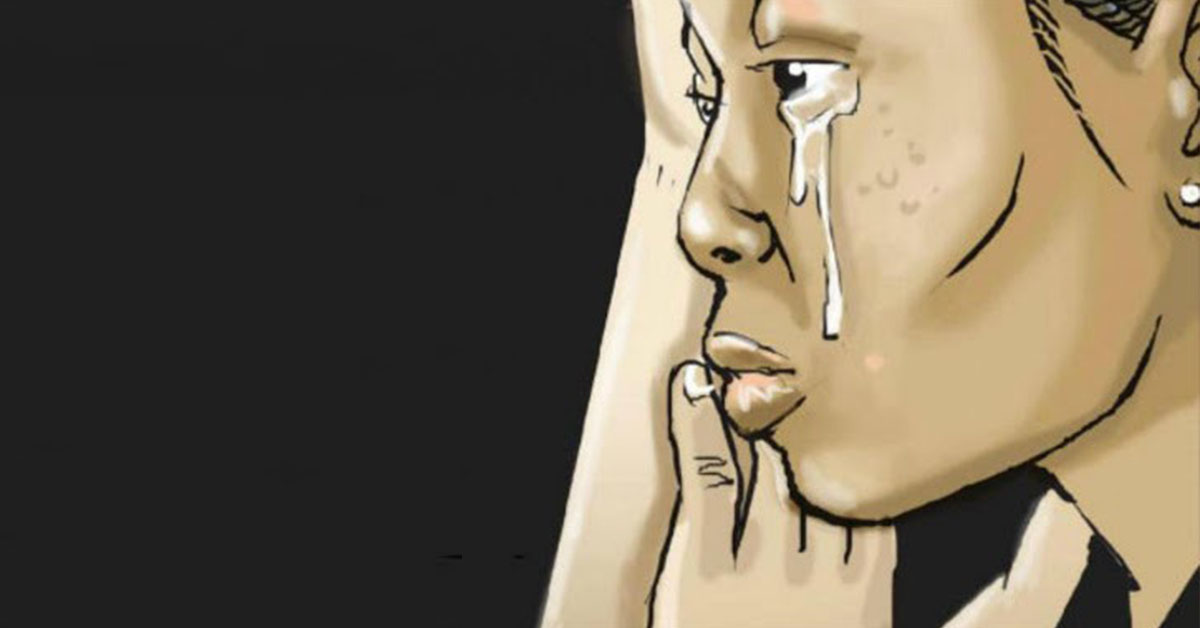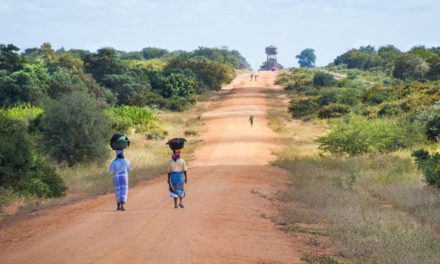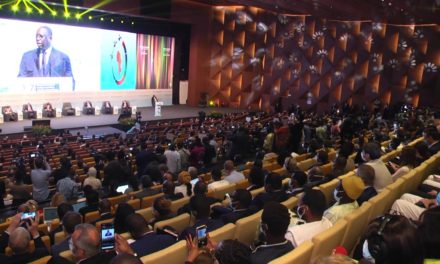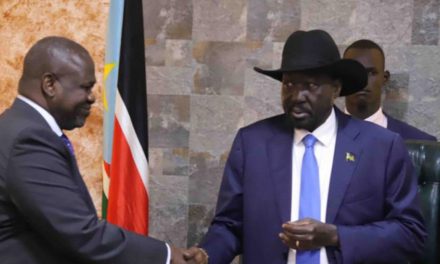
The Horrifying Tales Of Rape Survivors In South Sudan

February 27th, 2016 is a day Nyandeng, not her real name, would never forget. A mention of the date rekindles fresh memories of the worst life experience she underwent through at the hands of kidnappers who ended up raping her.
Sitting under a Neem tree, the 20-year-old Nyandeng stretched her six-feet-long body on a plastic chair with discomfort as we settled for this interview.
She wore a black dress with a sky-blue top to cover her bare shoulders, her black hair tied neatly, exposing her long and graceful neck; her exposed cheekbones were set up high against her broad forehead. Her arched brows formed a perfect frame for her bright eyes. Her shiny brown eyes filled with sorrow as she settled to narrate her painful ordeal.
Nyandeng’s tribulations are compounded by the fact that her own boyfriend was part of the nine-man gang that exposed her to the inhuman and beastly act.
She recalled the fateful Saturday afternoon, the traditionally hot, baking and scorching sun did not dampen Nyandeng’s resolve to stand out in public.
She was
dressed in a white long dress, unaware of what awaited her on the fateful day,
Nyandeng walked tall, head up. Unfortunately this would be the day she would
lose her virginity to a gang of rapists. Never in her life had imagined going
through such a horrendous experience in her life.
She was enroute to the market when she encountered a gang of nine men. One of The men was awfully familiar; an old friend, and he was a man she had dated for five years.
“He stopped me on my tracks and asked me to go with him to meet his wife. I declined. Suddenly eight of his friends grabbed me and bundled me into a waiting car. I screamed for help but no one came to my rescue,” Nyandeng vividly recalls as daring tears threatened to confirm her painful experience.
She says people who passed by as she was being dragged into the car were helpless because either they were too old or were unaware of what she was going through.
Nyandeng says the daring movie-like abduction saw the mean looking abductors portray images of a ‘trigger’ happy group that would go any extra mile to terminate any obstructer’s life.
In fact she says the strong men kept telling gullible passersby that she was their run-away sister and they would easily and cheaply back off.
Nyandeng was driven to an unknown destination and while in the car, they kept telling her to be happy, after all they had identified her suitor.
The only option she was left with was to struggle with her situation, cry and pray that the worst does not happen to her.
“I knew they meant what they were saying. When I thought of my education, I cried while pleading with them to let me free,” she recalls as she relentlessly and uncontrollably fights back rich tears.
Nyandeng says that abduction of women is still a common practice among some communities in South Sudan, especially in cases where forced marriages thrives.
She says her boyfriend did not seek her consent and everything happened within a second, the seemingly well planned abduction must have been well hatched. Nyandeng says her abductors locked her in a room for four hours.
“He came back alone at around eight in the evening and tried to force me to have sex with him but I resisted. Then he called his friends to hold me still so that he could rape me,” she pauses for a few seconds as she retreats into deep thought, the reality of what she went through sinking in.
Nyandeng’s resolve to speak out against rape is threatened by a possibly conspiracy between some outdated customs and traditions.
Throughout the interview, anger would submerge and drown her voice into compromised pronunciation of key words that would drive her point home. The same anger would collude to interrupt the interview by ensuring her tears irresistibly and generously flow as if on a lucrative tender supply mission.
“When his friends came into the room, a group of them undressed and removed my underwear while the rest held me,” she pauses and expressly bursts into tears.
Nyandeng is a blow by blow, word by word account of the horrifying experience women go through at the hands of rapists.
“I tried to resist but I could not. There were so many,” adding that nine men held her as one of them forced himself into her. She says as a virgin the penetration was too painful to bare. She shut her swollen eyes to let the tears of sorrow declare a field day on her cheek. Nyandeng says any time she thinks about the harrowing ordeal, she imagined the whole act was happening all over again.
“It is even more painful when your boyfriend rapes you in the full when his brothers are watching. I will never forgive him. I felt helpless and hopeless.” she quips.
“I lost my virginity, my pride and my dignity. At that moment I felt useless and contemplated commit suicide,” Nyandeng says recalling how every day of her seven days in hostage passed.
Col. James Dak Karlo, Police Protection Unit [photo by Mono Danga]
Fortunately, Nyandeng’s father got wind of the abduction and came to her rescue and took her home. A case was filed and the suspect was arraigned in court.
Medical reports showed she was HIV/AIDs negative but tested positive for pregnancy. This led to the withdrawal of the case from court because the accused agreed to marry her. The case was dropped without any charges and Nyandeng is now bearing the guilt and consequences of her father’s decision to withdraw the case.
“I thought that they would be arrested and put in prison. Unfortunately that did not happen. In South Sudan it is a waste of time to report rape cases and Sexual and Gender Based Violence (SGBV) to authorities. They will not do anything,” laments as she wipes her tears with an already soaked white handkerchief that bears testimonies of the cause of her pain and tears.
“The law is never implemented in this country. If there was law I would get justice. The current law enforcers deny women justice,” she said with utmost bitterness flashing across her face.
Nyandeng says even if her fate is in limbo, authorities charged with the responsibility of ensuring justice for rape victims should swing into action and deliver justice. “Give justice to everyone. It gives hope. I don’t feel like I am a human being anymore because of what those men did to me,” she quips.
She says if these men were imprisoned she would be set free of the self-imprisonment she is going through as a result of her nightmare.
Nyandeng who has been struggling to foot her school fees admits she would go back to school if she got a sponsorship from any organization or well-wishers. The 20-year-old mother says she lost hope in her future as a result of the ordeal.
“I have lost my pride, dignity, education, family and friends,” she added. Worse still her father insisted on her settling down with the rapist. This was after pressure from friends and close relatives who wanted her to be married off to the man they had arranged for her for a high dowry settlement. Nyandeng vows, “This will only happen over my dead body”.
In some communities, bad cultural practices such as early and forced child marriage, rape, domestic violence or violence against women and girl auctioning are seen as normal but also binding customary practices. Her father kept telling her to go and leave with her proposed husband because he did not want to take care of “somebody’s” son. She says initially after her rape ordeal, her father supported her and was very protective of her until later when he started convincing her to reconcile with the rapist.
Today, Nyandeng faces the danger of being thrown out of her father’s house with her two-year-old son if she does not marry the suspected rapist. “If my father insists that I marry the man I will leave his house. I can’t take my son to a rapist because I don’t want him to become like his father.” She says she wants to raise her son to become a responsible man.
The Police Protection Unit admits it is illegal for parents to force their daughters to marry men without their consent. “Parents should know that it is a crime to force their daughters to marry without their consent,” says Col. James Dak Karlo, deputy police spokesperson. He advocates for seeking justice for her and sending her back to school instead of forcing her to marry the suspected rapist.
“When you force a girl to marry a man she does not want, she ends up harbouring suicidal thoughts,” Karlo warns. He says parents and rape survivors should always report rape and defilement cases to the police GBV Protection Unit for better and quick health and justice delivery services.
Karlo adds that when rape survivors report to police under the special protection unit, all information will be kept confidential. “Our first step is to rush them to hospital for tests HIV/AIDS, Hepatitis, STDs and pregnancy tests and preserve the evidence. Then she is taken for psychosocial support because of the trauma they undergo,” Karlo explained.
He says the police protect the survivors until perpetrators are apprehended and taken to court for fair trial and sent to prison if proved guilty beyond reasonable doubt. Karlo reiterates that the concept that if survivors report police nobody will marry them, is a huge problem impeding survivors from reporting rape or any sexual violence cases.
Article 26:1 of the Child Act 2008 condemns child marriage and acknowledges the principle of best interest of the child as well as any practices that may deny the Girl-Child a chance to education. However, it does not clearly stipulate the punishment to the violators of this act.
Funmi Balogun, The UN Women country director, says when girls are raped, the families and the state does not view that these girls’ rights were violated. She says in cultures that are male dominated and militarized, women shall always be victims of sexual violence.
“They are looking at it from the point that a girl is better off being married to her rapist than being a woman that has no husband but has a child. They are not separating the fact that her rights have been violated,” Balogun says.
UN Women Country Representative Funmi Balogun during a workshop at Royal Palace Hotel in 2017 (File Photo by Morris Dogga)
Awut Deng Acuil, then Minister of Gender, Child and Social Welfare admitted in December 2018 during the launch of the 16 Days of Activism against Gender Based Violence that, even though South Sudan ratified all forms of international treaties to protect women’s rights, GBV remains common.
Awut said ignorance and poor sensitization limits women from knowing their rights that is why GBV is underreported in most parts of the country. Awut says there were 2,297 cases of GBV reported in the country in 2017 alone.
But The UN Women insists figures are not relevant when addressing sexual violence against women. “We don’t believe in statistics because one woman is too many to be violated,” Balogun stressed. She says it doesn’t matter how many women and girls are raped but rather when it happens the state should take action against the perpetrators.
“Women have the right to justice and the perpetrators have to be punished.” she added.
Drabuga Dorothy Ambrose, the Executive Director of Voice for Change in her office on 12th December 2018. (Photo by Moses Gum)
Drabuga Dorothy, The Director of Voice for Change, a local organization fighting for the rights of women, acknowledges that South Sudan has good laws but faces the challenge of implementation. She advocates for life sentence for rapists which will deter future perpetrators.
“They do not follow their code of conduct and as a result what they are doing is not right,” Dorothy said with scorn. She says it is unfortunate that these men are allowed to walk away with such crimes thereby encouraging others to do the same since there is no accountability.
“If there was justice and accountability people would fear going to jail. Sometimes if the perpetrators are arrested, they use the influence of their relatives who hold top positions in the government,” Dorothy reveals.
In December 2018, Médecins Sans Frontières (MSF) reported about 125 women gang raped by gunmen in Bentiu town, Unity State among whom were girls under ten years old and others are women older than 65. Ruth Okello, a midwife from MSF, told Reuters News Agency that pregnant women were not spared from these brutal attacks. However the then state Information Minister, Lam Tungwar denied the claims.
In October 2018, Rizig Bona, a 44-year-old South Sudanese man was arrested and charged with second-degree murder for raping and murdering his wife Anida Magaya in Surrey, British Columbia. Anida, 42, was a daughter of the late Alison Manani Magaya, a senior post holder in government.























Recent Comments